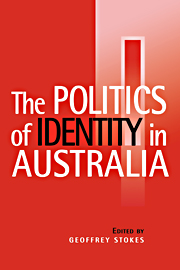Book contents
- Frontmatter
- Contents
- Acknowledgements
- Contributors
- Introduction
- Theorising Identity
- Gender and Sexuality
- Race, Place and Citizenship
- 8 Racialism and Democracy: The Legacy of White Australia
- 9 Immigration and National Identity: Multiculturalism
- 10 Australia and Asia: Place, Determinism and National Identities
- 11 Citzenship and Aboriginality: Two Conceptions of Identity in Aboriginal Political Thought
- Culture: Literature and Film
- References
- Index
8 - Racialism and Democracy: The Legacy of White Australia
Published online by Cambridge University Press: 05 June 2012
- Frontmatter
- Contents
- Acknowledgements
- Contributors
- Introduction
- Theorising Identity
- Gender and Sexuality
- Race, Place and Citizenship
- 8 Racialism and Democracy: The Legacy of White Australia
- 9 Immigration and National Identity: Multiculturalism
- 10 Australia and Asia: Place, Determinism and National Identities
- 11 Citzenship and Aboriginality: Two Conceptions of Identity in Aboriginal Political Thought
- Culture: Literature and Film
- References
- Index
Summary
Assertions of national identity aim to anchor cultures or nations in time, orienting them towards a future and linking them to a real or imagined past. Cobbled together from a variety of textual and symbolical materials as national identities usually are, they are frequently riddled with paradox and contradiction. This does not, of course, necessarily diminish their utility; coherence and truth are less essential here than practicality. But even identity claims which have long proved their usefulness can become impractical if societal values change or novel challenges arise. In these circumstances, dominant conceptions of national unity may seem to demand revision or renewal. Readings of history may become controversial as people plunder the past for values, characteristics or qualities that might be conscripted into present service. A nation's past may constitute a ‘repository of treasures’ to be drawn upon as circumstances require, but the value of any particular treasure is always contestable and frequently contested. The difficulty for those seeking to redefine a national identity lies not merely in choosing what aspects of the national heritage to retain and what to discard, but also in determining what elements contemporary society can be persuaded to embrace and what it wishes to repudiate. This chapter examines these issues of recovery and repudiation, with reference to arguments about White Australia.
The rhetoric of repudiation
Australian governments have been committed for some years to the repudiation of the institutional racialism which characterised the nation's past, most notoriously in the immigration laws known as the ‘White Australia’ policy.
- Type
- Chapter
- Information
- The Politics of Identity in Australia , pp. 117 - 131Publisher: Cambridge University PressPrint publication year: 1997
- 6
- Cited by



